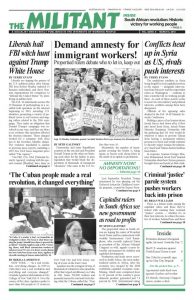On Jan. 19 locomotive engineer Tom Harding and train traffic controller Richard Labrie, members of United Steelworkers Local 1976, won acquittal by a jury on frame-up charges of criminal negligence for the deaths of 47 people in the July 2013 Lac-Mégantic, Quebec, oil train derailment and explosion. The Quebec prosecutor’s office announced Feb. 16 it will not appeal the verdict.
Facing some lesser noncriminal charges flowing from the disaster, Harding, the central target of the frame-up, a handful of Montreal, Maine and Atlantic Railway officials, and the now bankrupt railway company went on trial in a Lac-Mégantic courtroom Feb. 5.
In a deal brokered between the government and the defendants, Harding and the five railroad officials agreed to plead guilty to some of the charges.
Harding had said at a press conference Jan. 22, three days after he successfully defeated the frame-up, that he accepted some of the blame for the tragedy. “I assume this responsibility and I will always assume it,” he said. “I do not find the words sufficient to express my sympathies” to those affected.
During the more than three-month-long criminal trial it became clear that the profit-driven rail bosses, with complicity of the government’s Transport Canada agency, bore central responsibility for the disaster. To cut costs, they imposed a one-person crew on rail workers, created repeated threats to the safety of workers and those who lived by the tracks, and refused to allow engineers to engage an emergency braking system that would prevent runaway trains.
At the conclusion of the hearing Harding was sentenced to six months of house arrest, plus 240 hours of community service. The five company officials were each fined a maximum of $50,000, and the defunct railroad, which has no assets, was fined $1 million.
Lac-Mégantic resident Jean Clusiault, whose 24-year-old daughter died in the disaster, attended the hearing, as he had most of the earlier trial. Like most people in Lac-Mégantic, he said justice was done when Harding and Labrie were acquitted. He told the press that Edward Burkhardt, owner of Montreal, Maine and Atlantic, and other top officials should have been charged for the deaths.
When this hearing brought all the legal proceedings to a close, he told the Canadian Broadcasting Corporation, “I don’t think we will ever see any money from the MMA.”
Under pressure from trial revelations about Transport Canada’s collusion with Montreal, Maine and Atlantic officials to allow unsafe conditions on the railroad, Ottawa announced it would help fund the construction of a rail bypass around Lac-Mégantic, a demand residents there have been fighting for.
The widespread support for Harding among working people in the area was reflected when Yvon Deshaies, mayor of nearby Louiseville, officially invited Harding to carry out his community service there.
He said that the owners of restaurants, motels and other business there had offered to pay for Harding’s food, lodging and expenses.

